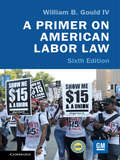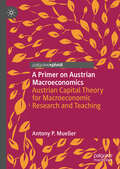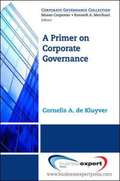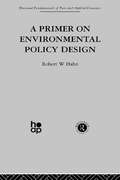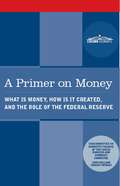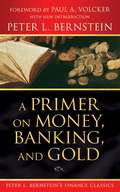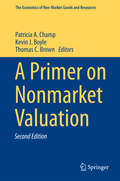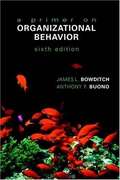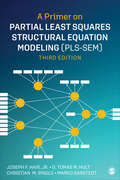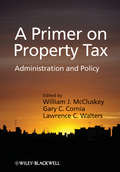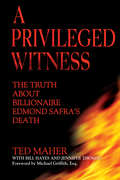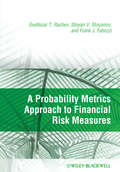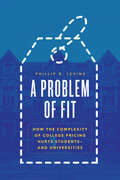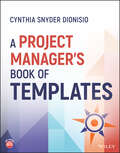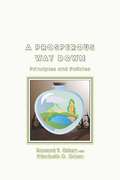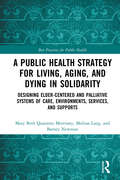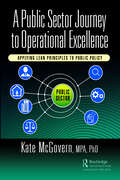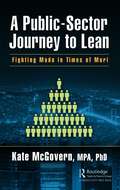- Table View
- List View
A Primer on American Labor Law (The\mit Press Ser.)
by William B. Gould IVThere are many new realities confronting labor in the United States. Technology is redefining traditional employment, and globalization continues moving manufacturing as well as service jobs to lower-cost jurisdictions. This timely sixth edition discusses the recent political developments that impact American labor, as well as new court cases and the social and economic issues that American workers are confronting. For union and employer representatives and labor lawyers, alike this volume not only describes the labor law system briefly and clearly, but also attempts to further an understanding among workers, unions, and businesses in order to promote an improved working environment. Professor William B. Gould, IV brings to this work more than a half-century of experience as a practicing labor lawyer and academic, as well as practical exposure to the relationship between administrative agencies and the public.
A Primer on Austrian Macroeconomics: Austrian Capital Theory for Macroeconomic Research and Teaching (Palgrave Studies in Austrian Economics)
by Antony P. MuellerThis book offers an accessible framework for macroeconomic modelling rooted in the capital theory of Austrian Economics. By distinguishing between the goods and monetary sides of the economy and exploring their interaction, the book provides a comprehensive macroeconomic model that integrates time preference and interest rates. It examines how monetary and fiscal policies can produce business cycles and how these cycles are influenced by central bank liquidity and financial market behaviour. Additionally, the book discusses the ways in which monetary and fiscal policies can prolong and intensify economic stagnation. Through its clear exposition, this book deepens the understanding of the conditions that determine the unsustainability of credit-driven economic expansions. It is essential reading for students and researchers in political economy, macroeconomics, monetary economics, and those interested in advancing Austrian Economics.
A Primer on Clinical Experience in Medicine: Reasoning, Decision Making, and Communication in Health Sciences
by MD, Milos JenicekMastery of quality health care and patient safety begins as soon as we open the hospital doors for the first time and start acquiring practical experience. The acquisition of such experience includes much more than the development of sensorimotor skills and basic knowledge of the sciences. It relies on effective reasoning, decision making, and comm
A Primer on Corporate Governance
by Cornelis A. de KluyverThis book is a primer on corporate governance--the system that defines the distribution of rights and responsibilities among different participants in the corporation, such as the board, managers, shareholders, and other stakeholders, and spells out the rules and procedures for making decisions on corporate affairs. Corporate governance also deals with how a company's objectives are set and the means of attaining those objectives and monitoring performance. The importance of this subject can hardly be overstated. As recent corporate scandals have shown and the current financial crisis reminds us, the efficacy of corporate decision making and our regulatory systems directly affect our well-being. Sound corporate governance not only pays by producing value for all stakeholders of the firm but also, even more importantly, it is the right thing to do--for investors, other stakeholders, and society at large. In other words, sound corporate governance is also a moral imperative. This book is designed to help you become a more effective participant in the corporate governance system--as an executive dealing with a board, as a director, or as a representative of a company's other numerous stakeholders. The book contains two major parts, an epilogue, and appendices. The first part looks at corporate governance from a macro perspective. It describes the U.S. corporate governance system and its principal actors and briefly surveys the history of U.S. corporate governance, including the wave of governance scandals that occurred around the turn of the century. The second part focuses on the board itself and its principal challenges: CEO selection and succession planning, the board's responsibilities in the areas of oversight, compliance and risk management, the board's role in strategy development, the issue of CEO performance appraisal and executive compensation, a board's challenges in dealing with unexpected events and crises, and finally, a board's most difficult challenge--managing itself. The epilogue briefly looks into the future and deals with subjects that are just beginning to appear on boardroom agendas. It assesses the emerging global convergence of governance systems, requirements, and practices; it looks at the prospects of further U.S. governance reform; and it discusses the changing relationship between business and society and its likely impact in the boardroom.
A Primer on Electric Vehicles in India: A Machine-Generated Literature Overview
by Saon Ray Deb MukherjiThis book presents the result of an innovative challenge, to create a systematic literature overview driven by machine-generated content. Questions and related keywords were prepared for the machine to query, discover, collate and structure by Artificial Intelligence (AI) clustering. The AI-based approach seemed especially suitable to provide an innovative perspective as the topics are indeed both complex, interdisciplinary and multidisciplinary, for example, climate, planetary and evolution sciences. Springer Nature has published much on these topics in its journals over the years, so the challenge was for the machine to identify the most relevant content and present it in a structured way that the reader would find useful. The automatically generated literature summaries in this book are intended as a springboard to further discoverability. They are particularly useful to readers with limited time, looking to learn more about the subject quickly and especially if they are new to the topics. Springer Nature seeks to support anyone who needs a fast and effective start in their content discovery journey, from the undergraduate student exploring interdisciplinary content to Master- or PhD-thesis developing research questions, to the practitioner seeking support materials, this book can serve as an inspiration, to name a few examples. It is important to us as a publisher to make the advances in technology easily accessible to our authors and find new ways of AI-based author services that allow human-machine interaction to generate readable, usable, collated, research content.
A Primer on Environmental Policy Design
by R. HahnDiscusses how the needs of the individual must be balanced with socially desirable ecological goals if the environment is to be protected.
A Primer on Fiscal Analysis in Oil-Producing Countries
by Paulo Medas Daria ZakharovaA report from the International Monetary Fund.
A Primer on Money
by Subcommittee on Domestic FinanceThe above quote was from a 1941 speech by U.S. congressman Wright Patman, a fierce critic of the Federal Reserve. A Primer on Money, released in 1964 by the Congressional Subcommittee on domestic finance, explains in Patman’s introduction “in simple, everyday language how the US monetary system works and indicates where it needs reform.” It describes specifically: - What is money? - How is money created? - The role of the Federal Reserve System - Money supply and Monetary policy - Improvements in the Money System Although this publication is over fifty years old and changes have been made to the Federal Reserve System since then, it is a testament to Patman’s insights that this report is still relevant and important to today’s discussion about the role of the Federal Reserve in the U.S. economy. This report is essential reading for students of monetary policy, academics, policymakers, journalists, and anyone interested in learning about the basics of money and the Federal Reserve.
A Primer on Money, Banking, and Gold (Peter L. Bernstein's Finance Classics)
by Peter L. Bernstein Paul A. VolckerOne of the foremost financial writers of his generation, Peter Bernstein has the unique ability to synthesize intellectual history and economics with the theory and practice of investment management. Now, with classic titles such as Economist on Wall Street, A Primer on Money, Banking, and Gold, and The Price of Prosperity--which have forewords by financial luminaries and new introductions by the author--you can enjoy some of the best of Bernstein in his earlier Wall Street days.With the proliferation of financial instruments, new areas of instability, and innovative capital market strategies, many economists and investors have lost sight of the fundamentals of the financial system--its strengths as well as its weaknesses. A Primer on Money, Banking, and Gold takes you back to the beginning and sorts out all the pieces.Peter Bernstein skillfully addresses how and why commercial banks lend and invest, where money comes from, how it moves from hand to hand, and the critical role of interest rates. He explores the Federal Reserve System and the consequences of the Fed's actions on the overall economy. But this book is not just about the past. Bernstein's novel perspective on gold and the dollar is critical for today's decision makers, as he provides extensive views on the future of money, banking, and gold in the world economy.This illuminating story about the heart of our economic system is essential reading at a time when developments in finance are more important than ever.
A Primer on Nonmarket Valuation (The Economics of Non-Market Goods and Resources #13)
by Thomas C. Brown Patricia A. Champ Kevin J. BoyleThis is a practical book with clear descriptions of the most commonly used nonmarket methods. The first chapters of the book provide the context and theoretical foundation of nonmarket valuation along with a discussion of data collection procedures. The middle chapters describe the major stated- and revealed-preference valuation methods. For each method, the steps involved in implementation are laid out and carefully explained with supporting references from the published literature. The final chapters of the book examine the relevance of experimentation to economic valuation, the transfer of existing nonmarket values to new settings, and assessments of the reliability and validity of nonmarket values. The book is relevant to individuals in many professions at all career levels. Professionals in government agencies, attorneys involved with natural resource damage assessments, graduate students, and others will appreciate the thorough descriptions of how to design, implement, and analyze a nonmarket valuation study.
A Primer on Organizational Behavior
by James L. Boditch Anthony F. BuonoTo introduce the key concepts that provide the basis for understanding of the field and give students a general survey of "typical" OB
A Primer on Partial Least Squares Structural Equation Modeling (PLS-SEM)
by G. Tomas Hult Marko Sarstedt Christian M. Ringle Joe HairThe third edition of A Primer on Partial Least Squares Structural Equation Modeling (PLS-SEM) guides readers through learning and mastering the techniques of this approach in clear language. Authors Joseph H. Hair, Jr., G. Tomas M. Hult, Christian Ringle, and Marko Sarstedt use their years of conducting and teaching research to communicate the fundamentals of PLS-SEM in straightforward language to explain the details of this method, with limited emphasis on equations and symbols. A running case study on corporate reputation follows the different steps in this technique so readers can better understand the research applications. Learning objectives, review and critical thinking questions, and key terms help readers cement their knowledge. This edition has been thoroughly updated, featuring the latest version of the popular software package SmartPLS 3. New topics have been added throughout the text, including a thoroughly revised and extended chapter on mediation, recent research on the foundations of PLS-SEM, detailed descriptions of research summarizing the advantages as well as limitations of PLS-SEM, and extended coverage of advanced concepts and methods, such as out-of-sample versus in-sample prediction metrics, higher-order constructs, multigroup analysis, necessary condition analysis, and endogeneity.
A Primer on Partial Least Squares Structural Equation Modeling (PLS-SEM)
by G. Tomas Hult Marko Sarstedt Christian M. Ringle Joe HairThe third edition of A Primer on Partial Least Squares Structural Equation Modeling (PLS-SEM) guides readers through learning and mastering the techniques of this approach in clear language. Authors Joseph H. Hair, Jr., G. Tomas M. Hult, Christian Ringle, and Marko Sarstedt use their years of conducting and teaching research to communicate the fundamentals of PLS-SEM in straightforward language to explain the details of this method, with limited emphasis on equations and symbols. A running case study on corporate reputation follows the different steps in this technique so readers can better understand the research applications. Learning objectives, review and critical thinking questions, and key terms help readers cement their knowledge. This edition has been thoroughly updated, featuring the latest version of the popular software package SmartPLS 3. New topics have been added throughout the text, including a thoroughly revised and extended chapter on mediation, recent research on the foundations of PLS-SEM, detailed descriptions of research summarizing the advantages as well as limitations of PLS-SEM, and extended coverage of advanced concepts and methods, such as out-of-sample versus in-sample prediction metrics, higher-order constructs, multigroup analysis, necessary condition analysis, and endogeneity.
A Primer on Property Tax: Administration and Policy
by Lawrence C. Walters Gary C. Cornia William J. McCluskey'The chapters in this book explore in detail the choices regarding both the structure and administration of the property tax, drawing on the extensive knowledge the authors have acquired in studying property taxes around the world. The chapters provide a wide-ranging treatment of the design choices and administrative tasks, both in terms of the breadth of design options and administrative tasks covered and the depth of the discussion. The authors describe the range of design choices, discuss the associated issues and the advantages and disadvantages for each, and present the criteria to help choose among the options.’ From the book’s Foreword by David L. Sjoquist, Professor of Economics and Dan E. Sweat Scholar Chair in Educational and Community Policy, Georgia State University Property taxation is a key element in providing a solid foundation and a stable funding source for basic public services. Developing and implementing a property tax system is a complex task. This complexity is compounded by the diversity of legal, cultural and historical contexts of policymakers and tax administrators. The World Development Report (1999-2000), Entering the 21st Century puts fiscal decentralization at the top of the development agenda. This makes local taxation - and especially the property tax option - of critical importance to both tax and land policy, as well as the broader development agenda. A Primer on Property Tax: Administration and Policy provides the reader with an analysis of issues surrounding property tax, including economics, law, public finance, decentralisation, valuation, GIS and property tax reform. A key strength of the book lies in the vast international experience of the authors and the book will provide for the first time material which is topical, cutting-edge and highly relevant to many of the disciplines involved in property taxation. The authors examine the criteria applied to evaluate the strengths and weaknesses of property tax, discuss the main valuation methods and the economic principles underpinning them and review the legal and administrative aspects of property tax worldwide.
A Primer on Sustainable Business
by Nancy E. Landrum Sandra EdwardsSustainable (and green) business seems to have become mainstream practically overnight. This growth in interest in sustainable business practices stems from changing societal expectations and a growing awareness that sustainability creates a win-win situation for the business and humanity alike. A Primer on Sustainable Business is a brief introduction to sustainability as it applies to business. This book will offer an overview of how sustainability is applied throughout the organization. We offer chapters organized by familiar departments or functions of the business and cover the applications and terminology of sustainability throughout each area. Whether you are an executive, an entrepreneur, an employee, or a business student, this book will help you understand the big picture of what it means to be a sustainable business and will give you the information you need to begin your journey toward sustainability.
A Primer on the Art of Finance: For Entrepreneurs
by Karen Berman Joe KnightIf you're like a lot of entrepreneurs, you may be a little mystified by the idea that finance is partly an art. But understanding the "artistic" aspects of finance is key to developing financial intelligence. This chapter examines how financial professionals make estimates and assumptions using accruals and allocations, depreciation, and valuation. This chapter is excerpted from "Financial Intelligence for Entrepreneurs."
A Privileged Witness
by Jennifer Thomas Bill Hayes Esq. Ted Maher Foreword by Michael GriffithBillionaire banker Edmond Safra was a superstar among the world’s wealthy elite, until he was mysteriously killed in a fire that consumed his lavish Monte Carlo penthouse. His nurse, former Green Beret Ted Maher, woke up the next morning bloodied and blamed. Now Maher breaks his silence about what really happened that fateful night, offering an insider’s look into Safra's last days and Ted’s ongoing fight to reveal the truth, answering long-speculated questions in this shocking true crime story. The mysteries surrounding Safra’s death were complex, with no shortage of potential suspects, from the Russian Mafia to Colombian drug cartels. Disputed events ignited a heated global controversy and threatened to tarnish Monaco’s image as a safe haven for the rich and famous. Ted Maher was held solely responsible for the crime. Ted’s journey from a dream job on the Côte d’Azure to a surreal nightmare of betrayal and deception has more levels of intrigue than a blockbuster spy thriller. With details the media couldn’t--or wouldn’t--reveal, A Privileged Witness opens a portal into the luxurious life of the Safras and a hard hard look into the 2,886 days of Maher’s ordeal. It's the final chance for an innocent man to clear his name.
A Probability Metrics Approach to Financial Risk Measures
by Svetlozar T. Rachev Stoyan V. Stoyanov Frank J. FabozziA Probability Metrics Approach to Financial Risk Measures relates the field of probability metrics and risk measures to one another and applies them to finance for the first time. Helps to answer the question: which risk measure is best for a given problem? Finds new relations between existing classes of risk measures Describes applications in finance and extends them where possible Presents the theory of probability metrics in a more accessible form which would be appropriate for non-specialists in the field Applications include optimal portfolio choice, risk theory, and numerical methods in finance Topics requiring more mathematical rigor and detail are included in technical appendices to chapters
A Problem of Fit: How the Complexity of College Pricing Hurts Students—and Universities
by Phillip B. LevineA critical examination of the complex system of college pricing—how it works, how it fails, and how fixing it can help both students and universities. How much does it cost to attend college in the United States today? The answer is more complex than many realize. College websites advertise a sticker price, but uncovering the actual price—the one after incorporating financial aid—can be difficult for students and families. This inherent uncertainty leads some students to forgo applying to colleges that would be the best fit for them, or even not attend college at all. The result is that millions of promising young people may lose out on one of society’s greatest opportunities for social mobility. Colleges suffer too, losing prospective students and seeing lower enrollments and less socioeconomic diversity. If markets require prices to function well, then the American higher-education system—rife as it is with ambiguity in its pricing—amounts to a market failure. In A Problem of Fit, economist Phillip B. Levine explains why institutions charge the prices they do and discusses the role of financial aid systems in facilitating—and discouraging—access to college. Affordability issues are real, but price transparency is also part of the problem. As Levine makes clear, our conversations around affordability and free tuition miss a larger truth: that the opacity of our current college-financing systems is a primary driver of inequities in education and society. In a clear-eyed assessment of educational access and aid in a post-COVID-19 economy, A Problem of Fit offers a trenchant new argument for educational reforms that are well within reach.
A Project Manager's Book of Templates
by Cynthia Snyder DionisioA PROJECT MANAGER'S BOOK OF TEMPLATES A helpful compendium of ready-made templates for managing every project in alignment with the latest PMBOK® Guide, 7th ed. Project Management is a growing discipline that has seen considerable recent development. Project managers are now expected to deploy predictive and adaptive methods, and to draw upon a considerable base of knowledge in developing and formalizing project plans. The Project Management Institute (PMI) publishes the authoritative Project Management Body of Knowledge (PMBOK® Guide), which contains the global standard for the Project Management profession. A Project Manager&’s Book of Templates is a vital companion to the PMBOK® Guide, providing a comprehensive set of templates and reports that helps project managers translate the content of the Guide into practical applications. It promises to be an indispensable resource for professionals in this fast-moving field. A Project Manager's Book of Templates readers will also find: Templates covering all types of work, such as starting, planning, project documents, logs and registers, and reports and audits. Templates representing all updated features of the PMBOK® Guide, including hybrid, adaptive and iterative practices, including Agile Easy, readable structure that moves project managers through the different types of work that is performed in project A Project Manager&’s Book of Templates isan essential companion for those preparing for the PMP Certification Exam, as well as practitioners and consultants to a range of global industries.
A Prosperous Way Down
by Howard T. Odum Elisabeth C. OdumA Prosperous Way Down, the last book by Howard T. and Elisabeth C. Odum, has shaped politics and planning as nations, states, and localities begin the search for ways to adapt to a future with vastly increased competition for energy. It considers ways in which a future with less fossil fuel could be peaceful and prosperous. Although history records the collapse of countless civilizations, some societies and ecosystems have managed to descend in orderly stages, reducing demands and selecting and saving what is most important. The authors make recommendations for a more equitable and cooperative world society, with specific suggestions based on their evaluations of trends in global population, wealth distribution, energy sources, conservation, urban development, capitalism and international trade, information technology, and education. Available for the first time in paperback, this thoughtful, provocative book forces us to confront assumptions about our world 's future and provides both a steadying hand and a call to action with its pragmatic analysis of a global transition.
A Public Health Strategy for Living, Aging and Dying in Solidarity: Designing Elder-Centered and Palliative Systems of Care, Environments, Services and Supports (Best Practices for Public Health)
by Mary Beth Morrissey Melissa Lang Barney NewmanWith more people living longer lives, there is increased importance in the health care industry on improving services for the elderly. This comprehensive book gives an expert overview of the topics and challenges, along with imperative ethical and legal frameworks. The book also details existing programs and benefits in relation to a realistic portrayal of population needs. Other important issues are covered such as long-term palliative care and hospice, other vulnerable populations, elder abuse, public-private collaboration, evidence-based policy-making, and much more.
A Public Sector Journey to Operational Excellence: Applying Lean Principles to Public Policy
by Kate McGovernLean management can lead to operational excellence, but toward what end? This book examines the power of linking Lean government operations with purposeful public policy. When Lean process improvement principles and techniques entered the public sector after decades of proven effectiveness in private industry, they brought the same transformative potential. These programs can improve public services, boost employee morale, and free up previously underutilized capacity. The freed capacity can then be applied to accomplish important societal objectives. This book has four parts: Part 1: The Foundation of Continuous Improvement (CI)—The reader is introduced to the field of CI and to Lean principles and techniques as applied to public sector organizations. CI initiatives can improve services, boost employee morale, and free up previously underutilized capacity. This part includes an overview of best practices and strategies for overcoming common challenges. Part 2: Lean Public Policy—Discussion of both purpose and function. Lean practitioners are systems thinkers. Viewing disparate processes as components of a whole, we seek to integrate functions across silos to maximize value, quality, and efficiency. It would be great if public programs could be designed for optimal functionality. If that were the case, then Lean practitioners would simply apply the Plan-Do-Study-Act/Adjust (PDSA) cycle for ongoing improvement. In the real world, policy making tends to be ad-hoc and reactive. This part explores impediments to Leaning existing programs and considers what Lean public policy would look like. Government regulatory functions and health care policy are used as examples. Part 3: Operational Excellence—Pulling policy and administration together by introducing John M. Bernard’s concept of three levels of maturity in government. Part 4: Putting it together—"What to do, how to do it, and who can get it done." A summary and overview of CI methodology and the prerequisites for the implementation of policies that will lead to progress on societal goals. Drawing lessons from practitioners striving for Level 3 maturity in government, the book closes with a series of recommendations.
A Public-Sector Journey to Lean: Fighting Muda in Times of Muri
by Kate McGovernMost Lean practitioners learn about the three Ms: muda (waste), mura (unevenness or variability), and muri (overburden), and beginners in Lean generally focus on the removal of muda. The impact of muri is not as readily understood. It is extremely significant, however, for those working in government. Decisions on staffing levels and resource allocation are made by elected officials who are generally disconnected from daily operations. Short-sighted cost-cutting makes it difficult to deliver quality services as efficiently as possible. The mantra of "do more with less" creates ever-increasing muri. In contrast to robust Lean programs in privately owned companies, efficiency initiatives are regularly cut from public-sector budgets. Antiquated systems remain in place, with too few workers to operate the existing processes. The debilitating impact of persistent muri brings burnout and turnover, perpetuating a vicious cycle. Despite the muri, a dedicated cadre of public servants is hard at work using Lean techniques and principles to break down bureaucratic red tape and improve the quality of services at every level of government across the country. While the author incorporated examples of Lean initiatives in other states to give readers an idea of all the terrific work that is occurring, this book is really the story of one of those journeys. Using the author’s experience while working for the State of New Hampshire, you’ll learn about the steps along the way. Each chapter tells a story of what they did, what they learned, and how the lessons can be applied. Annotated outlines of White, Yellow, and Green Belt programs, and the Lean for Leaders workshop, as well as two hypothetical scenarios that were used as training exercises are included. These approaches are not intended to be authoritative or prescriptive; they are offered as insights and examples. You’ll read about the challenges and pitfalls, and the creative countermeasures developed by a dauntless team of Lean practitioners. The story is shared to inform and encourage others -- material based on the New Hampshire Bureau of Education and Training’s Lean programs is included throughout the book.
A Purse of Your Own
by Deborah Owens Brenda Lane RichardsonTHERE IS NO BETTER TIME THAN NOW TO STRAIGHTEN OUT YOUR PURSE In A Purse of Your Own, wealth coach Deborah Owens draws from more than twenty years of experience in the financial services industry for a revolutionary and simple approach to investment literacy: Women can take control of their lives and purses by leveraging the feminine powers of intuition, creativity, and empathy to build personal wealth. Filled with quizzes (Pursercises), resource guides (Pursessentials), and examples of real women from housewives to executives who have drastically changed their lives (Purseonality Profiles), A Purse of Your Own will show you how to: Apply the 7 Wealthy Habits you MUST learn to be financially secure Buy stocks, bonds, and mutual funds and create a well-balanced portfolio on any budget Understand the language of investing and how to manage risk Find a good financial advisor (and recognize the warning signs of a bad one) Protect what you will build Creating and maintaining wealth can come only from understanding how money works. Use Deborah's "Power of the Purse" wealth-building strategy and your money will work for you!
